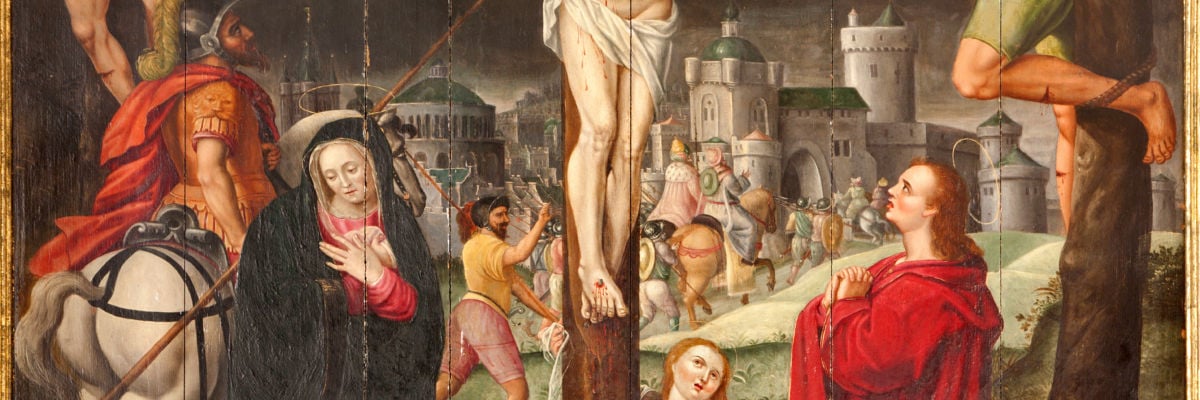
A caller asks the meaning behind St. Paul’s declaration that Christ became a curse for us in his Galatians 3:13. Joe Heschmeyer lays out biblical context and theological interpretations of this pivotal event in Christian history. Joe walks us through divine love, sacrifice, and the ultimate redemption.
Transcript:
In St. Paul’s epistle to the Galatians in chapter 3:13, he says that Christ redeemed us from the curse of the law by becoming a curse for us, for it’s written curse is everyone who hangs on a tree. This corresponds to a part in Deuteronomy 21:23 to be specific that says that those who were hanged on a tree were cursed by God. How is it that we can understand Christ becoming a curse without necessarily overcorrecting and saying, oh yeah, and God was completely cursing God and leading to this kind of Trinitarian view of the atonement, and how can we get this without overcorrecting? So I just want to know how.
Yeah, that’s a very good question and I’m very glad you asked that. So the first thing is when we talk about blessings and cursing, there’s a sense in which I think we use these terms without fully understanding what we mean by them. And a blessing is, I mean, in short, good things and a curse is bad things. And so quite clearly Jesus undergoes bad things. I mean, that’s obviously too mild of a way of putting it, but he clearly is cursed in that sense because he is going through a terrible suffering. We often don’t want to speak in that sense. I think we’re uneasy. But we could talk about job as seemingly being cursed by God. That doesn’t mean he wasn’t loved by God, but it does mean that God willed that he went through some hard times and that’s something that we should take very seriously.
So I think there’s a way people read the language of blessing and cursing, and they think that the people God blesses are the ones he loves, and the ones that He curses are the ones that he hates. And so you read something like, Jacob, have I loved Esau? Have I hated even there? Love and hate don’t work the same way that they do when we use that term in English. So likewise, when Jesus says you have to hate your father and mother to follow him, don’t literally hate your father and mother. That’s actually sinful too, that rather this is talking about blessing and cursing. This is talking about prioritization. This is talking about, we could say divine predilection, but it’s not talking about literal like dislike in cursing in that sense. That’s the first thing. Second, there’s a beautiful homily that then Cardinal Ratzinger gave on this theme in 2005, and he’s looking at two lines.
One is the one you mentioned from Galatians three 13, and the other is a parallel text in one Peter chapter two, verse 24, in which Peter says, in his own body, he brought your sins to the cross. And that gives us a hermeneutic to understand that Galatians three 13 seems to be saying the same sort of thing, that Christ is bearing the weight of our sins. And Raser says this, he says Christ Mercy is not a grace that comes cheap, nor does it imply that trivialization of evil Christ carries the full weight of evil and all its destructive force in his body and in his soul, he burns and transforms evil and suffering and the fire of his suffering in love. The day of Vindication and the year of favor converged in the Paschal mystery in the dead and risen Christ. This is the vengeance of God.
He himself suffers for us and the person of his son. So notice there the Father isn’t pitted against the Son. The vengeance of God is that Christ who is God takes on the full weight of sin and transforms it by his love and by his total gift to the Father. So this is when I talk about a good and evil way of viewing the cross. You don’t want to view where the Father a abandons and hates Jesus on the cross, that he turns his back on him because Jesus’ words on the cross, even after crying out, my God, my God, why have you abandoned me? What does he say after that, father, into your hands, I commit my spirit that we know the Father is actually looking in love at Jesus on the cross, and Jesus tells us that he will do so. In John 10, he says, for this reason, the Father loves me. No one takes my life from me, but I lay it down freely. That’s what’s happening, that this is something pleasing and good to God, that God the son, is carrying the full weight and burden of sin and transforming it in some way by offering this on our behalf to the Father.
Hey, thanks for watching. If you like this Catholic answer, be sure to like, subscribe and check out our live streams Monday through Friday, 3t o 5 PM Pacific, or find the episode after on YouTube, your favorite podcast platform or our Catholic Answers app.



